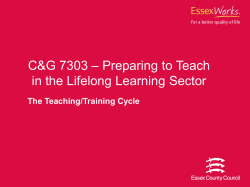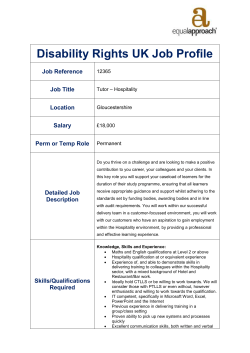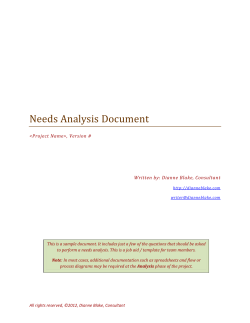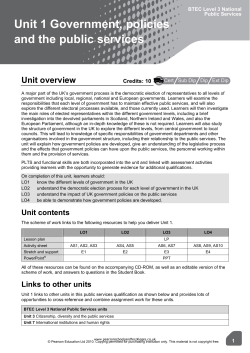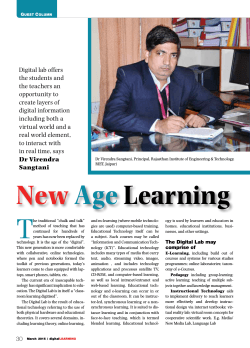
to apply - Scottish Credit and Qualifications Framework
THE SCOTTISH CREDIT AND QUALIFICATIONS FRAMEWORK PARTNERSHIP WRITTEN ESTIMATE FOR Evaluation of distance travelled since the production of the 2013 report on the perceptions, awareness and understanding of the SCQF as well as its impact and use among learners in Further and Higher Education, schools, private training providers, workplaces, and Community Learning and Development Date: May 2015 SCOTTISH CREDIT AND QUALIFICATIONS FRAMEWORK PARTNERSHIP A Company Limited by Guarantee. Registered in Scotland – Company number 311573 Registered Office: 39 St Vincent Place, Glasgow G1 2ER THE SCOTTISH CREDIT AND QUALIFICATIONS FRAMEWORK PARTNERSHIP Purpose: INVITATION TO PROVIDE A WRITTEN ESTIMATE. The Scottish Credit and Qualifications Framework Partnership (SCQF Partnership) invites written estimates for the provision of a piece of research covering the following for the Company: o Evaluation of distance travelled since the production of the 2013 report on the perceptions, awareness and understanding of the SCQF as well as its impact and use among learners in Further and Higher Education, schools, workplaces and Community Learning and Development This document provides information on the Company and sets out its requirements. The document is in four sections: Section 1 summarises the background to the SCQF Partnership; Section 2 provides the contract specification; Section 3 details the instructions for the submission of the estimate; Section 4 sets out the information required from the consultant/contractor. The document is designed to ensure that all estimates are given equal and fair consideration. It is important therefore that you provide all the information requested in the format and order specified in Section 4. 1. BACKGROUND TO THE SCQF PARTNERSHIP The Scottish Credit and Qualifications Framework (SCQF) was developed to help the needs of Scotland’s learners, learning providers and employers. It is a unified framework for qualifications in Scotland, which incorporates all of the mainstream Scottish Qualifications: the qualifications of Higher Education Institutions; SQA National Qualifications; Higher National Qualifications and Scottish Vocational Qualifications. The SCQF is a descriptive framework that can help learners, learning providers and employers to understand and compare qualifications. It provides a common language for learning, making the relationships between qualifications easier and allowing more flexibility and choice in learning. The SCQF aims to: Help people of all ages and circumstances to access appropriate education and training over their lifetime to fulfil their personal, social and economic potential. Enable employers, learners and the public in general to understand the full range of Scottish qualifications, how qualifications relate to each other and how different types of qualifications can contribute to improving the skills of the workforce. In November 2006 the SCQF Partnership was established as a company limited by guarantee to manage the Framework. The company became a charity registered in Scotland in March 2007. Its members are: the Quality Assurance Agency for Higher Education; College Development Network; the Scottish Qualifications Authority; and Universities Scotland. It can also co-opt up to two Directors. Currently there is one co-opted Director representing the interests of employers. The Company objectives are: to maintain the quality of the Framework; to further promote and develop its use; and to maintain and develop relationships with other frameworks in the UK and Europe. The following sections in this document provide details of the Company’s requirements and instructions for the written estimate. 2. CONTRACT SPECIFICATION Background Since the SCQF was launched in 2001 several important pieces of research have been carried out with learners and stakeholders. These have proved very useful when shaping the direction of strategic priorities. An evaluation of the 2003-2006 Implementation Plan resulted in the formation of the SCQF Partnership and in 2010 the Frontline Report was published demonstrating progress and impact of the Partnership to date. With continued support from the Scottish Funding Council, we are now into the fifth year of a planned rolling research programme looking at the impact of the SCQF across sectors. We have segmented stakeholders across the years and looked separately at the HE/FE sector, schools, employers and private training providers, parents and carers and learners across all sectors. We now wish to build on research carried out in 2012- 2013 which reported on: the perceptions, awareness and understanding of the SCQF as well as its impact and use among learners in Further and Higher Education, schools, workplaces and Community Learning and Development settings and an evaluation of the understanding, awareness and perceptions of the SCQF among management and teaching staff in schools and among parents/carers with an analysis of how the benefits of the framework were being communicated to learners The results of that work can be accessed in the Ashbrook Report on the SCQF website. http://scqf.org.uk/wp-content/uploads/2014/04/Ashbrook-Report-Key-Findings-Learners-TeachingStaff-July-2013.pdf This year we want to unpack in more detail these two very distinct pieces of work and commission two separate pieces of research looking at distance travelled since the Ashbrook Report. One project will look at the impact the SCQF has on learners across all sectors while the other project will examine impact amongst management and teaching staff in schools and among parents and carers. For this project specifically, we want to find out more about the impact the Framework is having among learners in Further and Higher Education, schools, workplaces, private training providers and Community Learning and Development settings, how they are using it and whether or not perceptions, awareness and understanding of the SCQF have changed since the Ashbrook research of 2012. The SCQF has been identified as a key tool to promote lifelong learning, allowing individual learners to make more informed choices. It is recognised as a tool which will support transitions and encourage progression by enabling learners to see how different qualifications in Scotland relate to each other. This research would build on evidence gathered in 2012/13 identifying the ways in which raising awareness of the SCQF in schools is improving its understanding among learners and in turn helping them plan their learning journey more effectively. We see this being an in-depth analysis of learners of all types and therefore anticipate a piece of work that provides strong qualitative information reinforced with quantitative data that results in a robust narrative report that will be presented to the SCQFP Board of Directors. Current specific knowledge of the SCQF will be particularly advantageous here. With this in mind the SCQF Partnership would like to appoint a consultancy to undertake the piece of research detailed below: Project Specification – Aims and Objectives To assess distance travelled since 2013 evaluating the level of awareness, perceptions and understanding of the Framework among learners in Further and Higher Education, schools, workplaces, private training providers and the community learning and development sectors, specifically to establish if and how learners are finding out about the Framework and how well that information is understood. To evaluate the extent, nature and impact the SCQF has on learners across all sectors and to establish how the Framework is being used by individual learners providing evidence of usage. The SCQF strategic plan recognises the increasing acceptance of the SCQF as an essential support for individual learners and learning providers in Scotland. However, it also recognises that within some sectors the SCQF has not had the same impact as in others. This was emphasised in the results of the 2013 research. This exercise should therefore: Measure progress made in embedding the framework and assess the extent to which the SCQF is understood by learners in Further and Higher Education, schools, workplaces and in community learning and development settings including: a) How the SCQF is helping learners to understand the range of qualifications available in Scotland and whether the inclusion of the new national qualifications and Apprenticeship Programmes on the Framework has altered this b) How the SCQF is helping people understand the value of learning they have achieved and how this could be used for further participation in lifelong learning Qualitative research should also tell the story of the progress made by learners in these sectors in using the Framework and should include highlighted examples. This should address the following areas: a) Is the SCQF still helping learners to make decisions about their future learning and if so, how? b) Is the SCQF still supporting progression upwards and across the Framework including use of credit transfer and if so, how? c) Does the SCQF have any negative implications for learners in the HE/FE/CLD sectors and/or in schools or in the workplace? As with the original research in 2013, this work should also identify any barriers preventing further progress being achieved by learners and identify the factors that will influence and inform future work in further implementation of the SCQF among learners. Timescales Deadline for submissions: 5.00pm 29 May 2015 Appointment of consultant by 12 June 2015 Initial briefing meetings with SCQF Partnership team to ascertain further background, contact information, priorities and timescales: 15 June 2015 Take account of previous research undertaken in these areas Regular update meetings to be incorporated into Methodology to brief SCQF Partnership on progress to date First draft of report by Friday 8 January 2016 Feedback on first draft Friday 15 January 2016 Final report by Friday 29 January 2016 There will be key milestones which will be agreed dependent on the final agreed methodology Methodology Whilst it is the responsibility of the consultant to fully describe their proposed methodology within their submission document, it is expected that interviews would take place with learners and learner representatives in the HE/FE/CLD and schools sectors and with learners in workplaces. Learner representatives could include but is not restricted to organisations such as: SPARQS National Union of Students Scottish Union Learning Student Representative Councils/Student Associations Youth Scotland National Parents Forum Scotland Scottish Parent Teacher Council Young Scot Education Scotland SQA In addition it is expected that focus groups and questionnaires would also form part of the research/evidence gathering for both the learners and their representatives. Where circumstances dictate, telephone and e-mail contact with representative organisations may be necessary to assist with clarity and understanding. Budget The budget for this piece of work is £10k 3. INSTRUCTIONS FOR SUBMISSION OF THE WRITTEN ESTIMATE Please do not hesitate to contact Anthony O’ Reilly if you require further information. Contact details are: SCQF Partnership 39 St Vincent Place Glasgow G1 2ER e-mail: anthony@scqf.org.uk Tel: 0141. 225 2932 3.1 Timetable and administration arrangements Return of written estimates (email versions acceptable) Expected date of award 5pm on Friday 29 May 2015 12 June 2015 The SCQF Partnership may invite proposers to meet with them to allow them to elaborate on their proposals as set out in the written estimate. If this was the case this would take place on 3 June 2015 3.2 Evaluation Criteria The written estimates will be evaluated fairly to ascertain which represents the best value for money in terms of the criteria. Your response to our requirements will be evaluated under the following headings: The ability to undertake the work outlined in the Contract Specification;and within the agreed timescale; Evidence of your understanding of our requirements and of the SCQF; Value for money/added value (Please note that the order in which the criteria are listed does not imply relative importance) 3.3 Administration arrangements a. Receipt of estimates Written estimates will be received up to the time and date stated. The SCQF Partnership does not undertake to consider any written estimates received after that time. b. Acceptance of Estimate By issuing this invitation the SCQF Partnership is not bound in any way and does not have to accept the lowest, or any estimate. c. Confidentiality All information supplied by the SCQF Partnership to you must be treated in confidence and not disclosed to third parties except insofar as this is necessary to obtain sureties or quotations for the purpose of submitting the tender. All information supplied by you to the SCQF Partnership will similarly be treated in confidence except that references may be sought from banks, existing or past clients, or other referees submitted by the proposer. 4. INFORMATION REQUIRED FROM PROPOSER It is important that you provide all the information requested below. Please provide it in the order and format indicated. Part 1 Breakdown of prices and rates Part 2 Information about your organisation Part 3 Details of the service, including proposed methodology and details of the team who would be working on the engagement Part 4 A Quality Plan Part 5 Additional information PART 1 BREAKDOWN OF PRICES AND RATES Insert here your breakdown of prices and rates. This should include an overall cost for the contract and specific details of costs for: professional services administration travel and subsistence meetings VAT* *please confirm whether or not you are registered for VAT. Please also set out the VAT liability of the services to be provided to SCQF. PART 2 INFORMATION ABOUT YOUR ORGANISATION Please include here information about your organisation including; number of staff, management structure, a description of the nature of the work carried out by your organisation, and any other information which may be of assistance in considering your tender. Please also indicate any European or British quality standards achieved or being sought. PART 3 DETAILS OF THE SERVICE, INCLUDING PROPOSED METHODOLOGY, DETAILS OF THE TEAM WHO WOULD BE WORKING ON THE ENGAGEMENT AND THEIR UNDERSTANDING OF THE SCQF 1 Give details of the resources you expect to use to service the contract, including the number of staff you expect to use for providing the service. 2 Indicate in each case whether you expect staff to be drawn from within your organisation, be newly recruited or sub-contracted. 3 Please enter the names and position held by key staff. 4 Please provide details of experience of key staff involved in the contract. 5 Please set out your proposed methodology PART 4 QUALITY PLAN Give details of how you will ensure that a high quality service is maintained and that all targets set out in the Contract Specification will be met including your proposed methodology 1 Set out your proposals for the monitoring and reporting on the quality of the services delivered including the performance checks you will perform, their frequency and scope, and who will perform them. 2 Set out your proposed contract management system. 3 Set out your strategies and procedures for dealing with complaints and problems. Note: your quality plan will not itself form part of the contract, but any elements within it which the parties agree to be essential to the delivery of the service will be incorporated within the specification and form part of any contract resulting form your tender. PART 5 ADDITIONAL INFORMATION Set out any additional information you think would be helpful in support of your proposal, including any additional facilities not included in the specification you could or will offer that will add value to the service that you will provide.
© Copyright 2025

